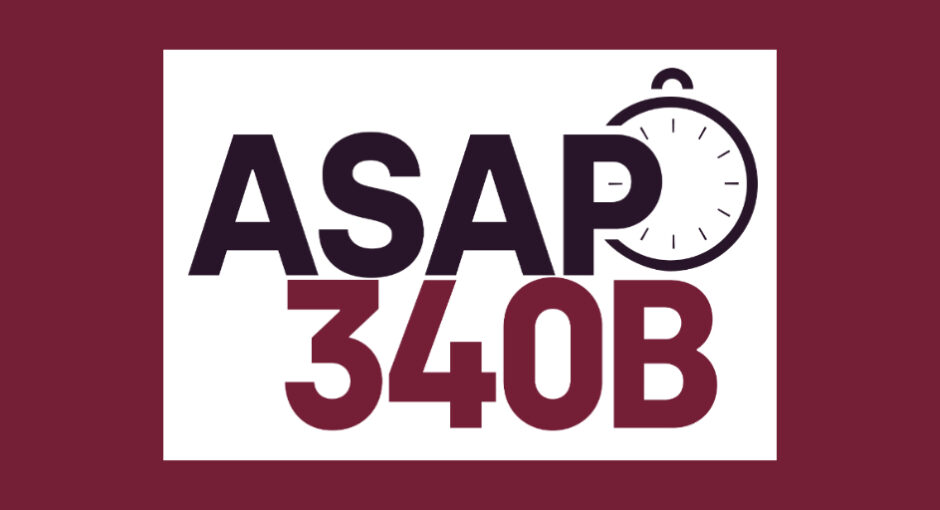ASAP 340B, the nonprofit group that the brand drug industry and health centers formed to help advance the two sides’ joint plan to remake the 340B program, held its first webinar yesterday to describe its policy principles and call for “difficult conversations” among 340B hospitals and other stakeholders.
Pharmaceutical Research and Manufacturers of America and the National Association of Community Health Centers launched ASAP 340B in early March. Its 10 policy principles portray 340B federal grantees and rural hospitals as “true safety-net providers.” It says other 340B hospitals “are abusing the lack of clarity in the 340B program, taking advantage of vulnerable communities, and jeopardizing the program’s ability to help those it was intended to serve.”
NACHC Director of Regulatory Affairs Vacheria Keys said ASAP 340B’s goal is to “move the conversation forward.” Hospitals need to take the initiative to engage with the group, she said.
Asked to comment about hospitals that disagree with the group’s proposals, she said, “If you feel like the ASAP 340B policy principles do not represent the hospital perspective, you are correct.”
“For your perspective to be represented, you have to work with us, you have to have conversations with us, and you have to provide feedback,” Keys said. “We are having conversations, and we are looking for a hospital partnership. That does not mean you have to sign onto ASAP 340B that day, but meaningful conversation is not just shouting your viewpoint into the wind. It’s really taking in what the other side is saying and responding to that.”
Keys said ASAP 340B was born after NACHC reached out to PhRMA to find middle ground, especially on 340B contract pharmacy arrangements. Twenty-three manufacturers impose conditions on 340B pricing involving delivery to contract pharmacies. Ten have policies that apply to health centers. Health centers historically have relied heavily on contract pharmacies because they cannot afford in-house pharmacies.
“We tried to work within the existing 340B Coalition that NACHC was a part of with other entity groups, and we understand that all covered entities are not impacted by the contract pharmacy disputes as much as health centers,” Keys said. “But the impact on health centers of being caught in the [crossfire] between manufacturers and hospitals really put NACHC in a position where we had to put our members’ priorities first. And to do that meant that we went to the other side to see how we can find compromise.”
The 340B Coalition is holding its annual summer conference July 10-12 near Washington, D.C.
Panelist Jen Laws, president & CEO of Community Access National Network, said all 340B stakeholders “have to come together” to accomplish 340B reform. “If folks refuse to come to the table from their own perspective because they feel like we’re going in the wrong direction, then we can’t adjust to that,” he said. CANN receives financial assistance from PhRMA, according to PhRMA’s most recent publicly available federal tax forms.
Webinar panelist Dan Neves, federal policy director at Genentech, was asked about the seeming mismatch between PhRMA’s alliance with health centers and the recent string of manufacturers extending their 340B contract pharmacy restrictions to health centers. Just since May, Boehringer Ingelheim, Bausch Health, and Merck have placed new limits on contract pharmacy use that apply to health centers. Genentech, notably, has not placed any contract pharmacy restrictions.
Neves said he could not speak for other pharmaceutical companies but noted: “Contract pharmacies participating in the [340B] program should have to provide the same kind of patient affordability assistance that’s provided by covered entities.” Earlier during the webinar, Neves spoke about the “proliferation” of 340B disproportionate share hospitals and child sites, some of which he said do not use the 340B program as Congress intended.
ASAP 340B Executive Director Thomas Johnson said, “Since our launch earlier this year, we have had many energizing and highly productive conversations with stakeholders across the 340B ecosystem, and we look forward to continuing that open dialogue through our first webinar. We are excited to provide a platform where anyone with a stake in the 340B program can learn about the comprehensive set of principles that must guide efforts to authentically reform the program so that it supports the safety net providers and the patient communities it was truly meant to serve.”


